Is Your Perfume Poisoning Your Family?
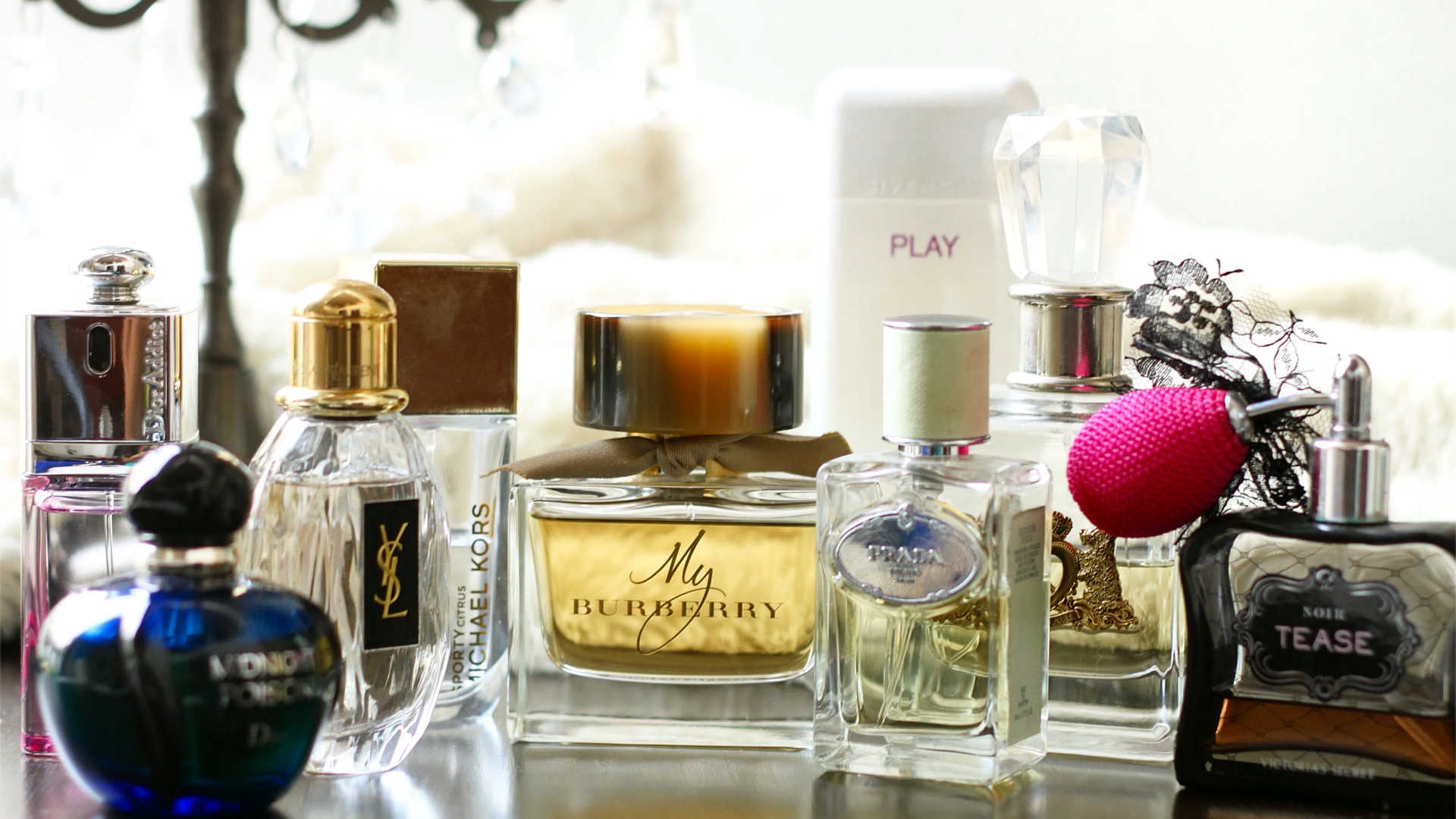
Those chemicals are potent and persistent.
Perfumes and fragrances are extremely popular. I know there are many people who can’t even think about leaving the house without a little spritz. By 2025, the global fragrance market, which includes perfume, deodorant and antiperspirant, is predicted to be worth over USD$92 billion. Perfumes tend to draw on essential oils in their formulations, but also include a number of chemicals (many known and probable carcinogens) that are outright health hazards.
Fragrance is referred to as the new second-hand smoke. And for very good reason. This isn’t just about you and your preferences. Your perfume habit affects everyone around you – including children who are at the highest risk health-wise.
What is Perfume Made Of?
You may have seen a number of names for products, including perfume, eau de parfum, eau de toilette (you know this means toilet water, right?) and eau de cologne. They get these names by the concentrations of essences or oils the product contains. Perfume has the highest concentration of oils/essences, while eau de cologne has the least. Cologne is also typically associated with men, and perfumes with women.
It gets a little confusing when perfumes are also called fragrances. Fragrance, as a term, is used interchangeably with perfume to refer to the entire bottle or product, and fragrance is also an ingredient found in products. But it doesn’t quite end there – fragrance, in and of itself, is an umbrella ingredient that can include thousands of chemicals that are untested and potentially unsafe. Fragrance is listed instead of each individual ingredient so companies can protect their trade secrets or signature scents.
A study of 17 popular name brand fragrances found, on average, 14 secret ingredients per product that were not listed on the label but found through testing. You can read an extensive report on the risks of fragrance, including assessments of popular products, right here. The Canadian version is here.
Government Regulations for Perfume
The laws around perfumes and fragrances depend on where you live. The United States has a very relaxed approach to cosmetics, while Canadian and EU laws are more strident.
I’ve included some highlights below, but in general, the perfume industry is self-regulating. Countries like Canada and Europe, as well as the US, consult The International Fragrance Association (IFRA) and the Research Institute for Fragrance Materials (RIFM) for advice on safety standards. RIFM uses experts that aren’t affiliated commercially with perfume companies and publishes in peer-reviewed journals.
United States: Perfume Regulation Highlights
- Cosmetic ingredients, except for colour additives, do not need FDA approval before going to market.
- Fragrance, which can be a collection of natural and synthetic ingredients, is allowed to be listed only as ‘fragrance’ on the label in order to protect trade secrets.
- The FDA prohibits misbranding (false labelling) or adulterating cosmetics, and will take companies to court if they violate this. You can read more about how the FDA defines misbranding and adulterating here.
- According to the FDA: “Companies and individuals who manufacture or market cosmetics have a legal responsibility to ensure the safety of their products. Neither the law nor FDA regulations require specific tests to demonstrate the safety of individual products or ingredients. The law also does not require cosmetic companies to share their safety information with FDA.” (bolded emphasis mine)
- The FDA doesn’t require allergen-friendly labelling for cosmetics. If citizens have a fragrance allergy or sensitivity, the government recommends choosing fragrance-free products, reading labels and calling companies for information. But if you have a fragrance allergy and the FDA doesn’t require all of the ingredients in fragrances to be listed to protect a company’s trade secrets, how can we know if a product is truly safe?
Basically, what we have going on is an honour system. If the government doesn’t require companies to show their products are safe or share their data, where is the accountability? If I gave you a math test without asking you to show the steps you used to get to the final answers and didn’t even ask you to hand in the test for review at all, how would I know you actually knew the math? Except, in this case, there is more at stake than numbers.
Canada: Perfume Regulation Highlights
- Canada consults the IFRA and RIFM for safety data.
- Cosmetic products sold in Canada must meet the requirements of the Food and Drugs Act and the Cosmetic Regulations. Ingredients must be disclosed and labelled.
- Canada has a Cosmetics Ingredient Hotlist that lists all prohibited and restricted ingredients. Prohibited ingredients cannot be used at all, while restricted ingredients can only be used under certain conditions or concentrations.
- If Health Canada finds a fragrance ingredient unsafe, it will prohibit use and put it on the hotlist. However, “components of a fragrance can be listed as individual ingredients or can be listed under the term ‘parfum’ “. You’ll still need to delve into labels and ask more questions if you see the word ‘parfum’, as parfum could be a compendium of more ingredients.
- Health Canada regularly reviews ingredients and the scientific data around them to assess safety.
Common Toxic Ingredients in Perfume
Here are two charts shared in this report.
Common Perfume and Cosmetic Ingredients That Can Impact Our Health:
- Fragrance
- BHT
- Coal Tar Dyes
- Formaldehyde
- Parabens
- Phthalates
- PEG compounds
- Synthetic musks
- Synthetically Derived Essential oils
I delve into the health risks of ingredients to avoid in personal care products in more detail here, and let’s talk about some fragrance/perfume specific risks below.
Health Risks of Perfume
Aside from the health risks of common ingredients in perfumes and other scented personal care products (fragrance, parabens, etc.), there is evidence that fragrances can cause or aggravate certain health conditions. Remember, this isn’t just about you but affects everyone who can smell you – your partner, children, co-workers, friends, that little old lady beside you on the bus.
These include:
- Headaches: A study of 200 migraine sufferers and 200 participants with tension headaches found that odours from perfume can trigger migraines within minutes.
- Contact Dermatitis: Fragrances are one of the most common causes of contact dermatitis and contact allergies. A number of studies that use patch tests show that physical exposure to perfumes and fragrance ingredients can cause contact dermatitis, exacerbate eczema, and cause rashes.
- Asthma: One study of perfume strips showed that inhaling perfume can exacerbate symptoms and cause airway obstruction in asthma patients, while another found that perfume can instigate asthma-like respiratory symptoms. In a 19-year surveillance of workplace asthma in California, researchers discovered that fragrance used at work was commonly associated with work-related asthma (WRA), and that 242 of the recorded cases of WRA were linked to perfume or cologne. Finally, in a self-reported national survey of just over 1,100 people, 46.2% of asthmatics reported adverse effects after being near someone wearing a fragrance product – and 35.4% said they missed out on work or lost jobs due to workplace fragrance exposure.
- Respiratory Issues: In a study that compared healthy volunteers to people with perfume-induced respiratory issues, blood tests showed an increase in histamine production in the group with respiratory issues. Histamine is part of our immune response to pathogens in our bodies and can cause inflammation. People with respiratory and lung issues also report being affected by scents and perfumes.
- Endocrine Disruption: Many of the chemicals used in perfumes can alter the endocrine system. A study that tested a range of 213 household and personal products found a number of endocrine-disrupting chemicals including BPA, phthalates, parabens and fragrances. In an analysis of 5 different types of phthalates in 47 brands of perfumes, researchers said they found ‘considerable amounts’ of phthalates in all brands, and a few had phthalate amounts that were above threshold limits.
- DNA Damage: In a follow-up study by the researchers who tested phthalates in 47 perfumes, they discovered that all the perfumes they tested induced DNA damage.
Better Alternatives to Conventional Perfume
What do you do if you love perfume, but not the health risks?
- DIY Perfume. Make your own scents using high-quality essential oils. You can mix and match to suit your tastes and mood! Here is one to start off with.
- Buy Non-Toxic Perfume. Read labels and source companies that use ingredients you trust. As you may already know, I am a huge fan of Living Libations*. Their perfumes and colognes use pure essential oils. They aren’t overpowering and don’t last forever after you apply them, and that’s OK.
Free Resource Library
Enjoy more than 40 downloadable guides, recipes, and resources.
Why Are We Using Perfume?
Interestingly, the FDA says, “If a product is intended to be applied to a person’s body to make the person more attractive, it’s a cosmetic under the law.” Fragrance falls under this category of products.
And hey, I know that we want to feel good about ourselves and look great, and how we smell is a part of that. Yet painting over foul smells with perfumes and fragrances isn’t going to resolve the source of that smell – so what is the underlying issue here? Is there a bigger health problem that needs to be addressed? As I’ve written before when talking about hair, skin, and beauty products, much of our success relies on what we do internally from the inside out.
Resolving body odor may be as simple as taking a shower, or the solution may involve a deeper dive into diet and lifestyle practices.
Creating a Fragrance-Free Work Environment
Depending on where you live there may or may not be policies in place restricting fragrances in the workplace. In recent years there has been an increased awareness about fragrance sensitivities, and you’ve probably seen signs posted in doctors’ offices, community centres, gyms, yoga studios, and schools requesting scent-free environments. If this is something you’d like to implement at your workplace, the Canadian Centre for Occupational Health and Safety has detailed tips about how to create a scent-free policy.
Further Reading on Fragrance and Personal Care Products
- 13 Ingredients to Avoid In Personal Care Products
- 20 Natural Beauty Care Recipes
- Inside My Makeup Bag: What I Use and Love
- Unconventional Ways to Get Glowing Skin
- How to Know If Your Essential Oils Are Top Quality?
- The UnFreshening Ingredients in Toxic Air Fresheners
- Is Arbonne Really As Pure And Safe As They Claim?
Adjusting our perfume habits can be challenging at first. Once you go unscented or use naturally scented options, it’s often hard to return to those conventional products! You’ll start to smell them for what they really are.
*This post contains affiliate links
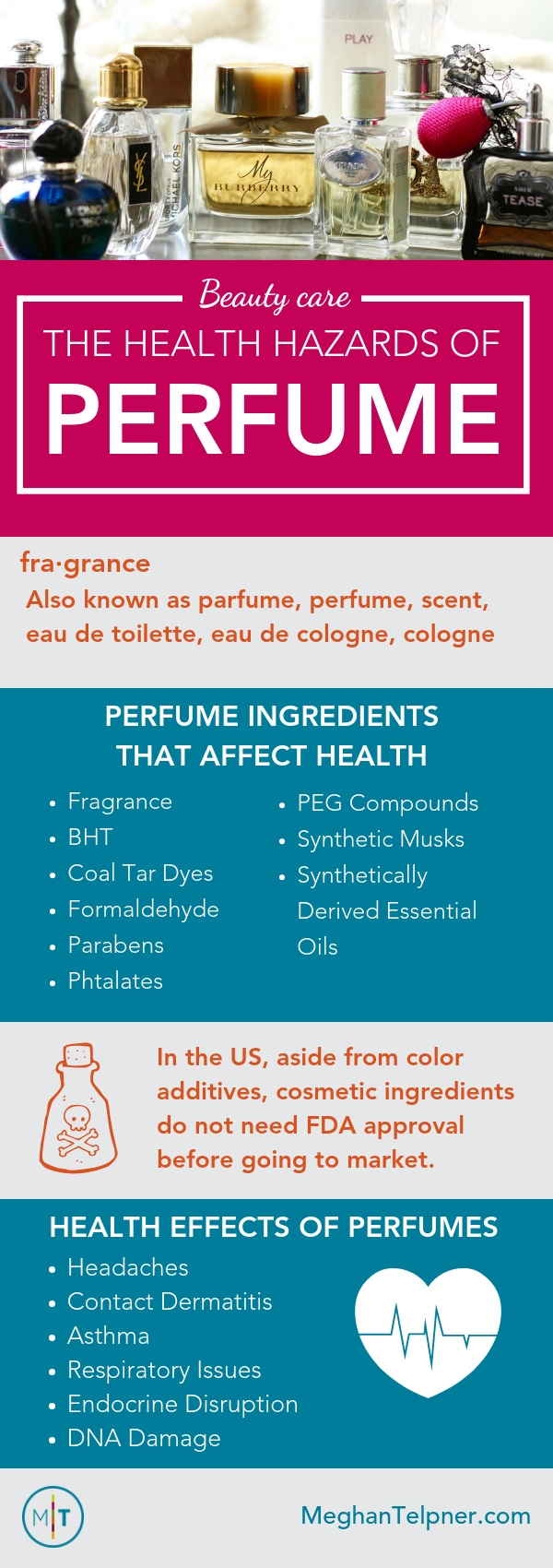
Free Resource Library
Enjoy more than 40 downloadable guides, recipes, and resources.















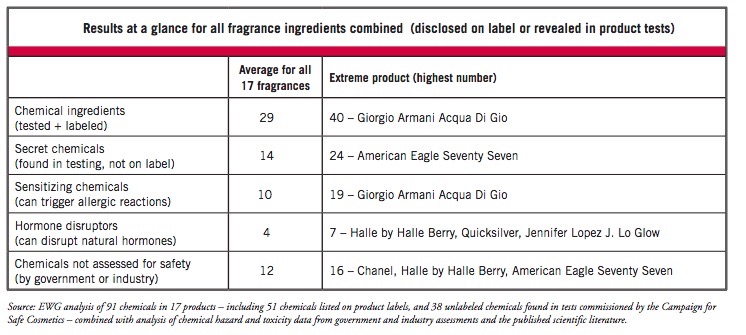
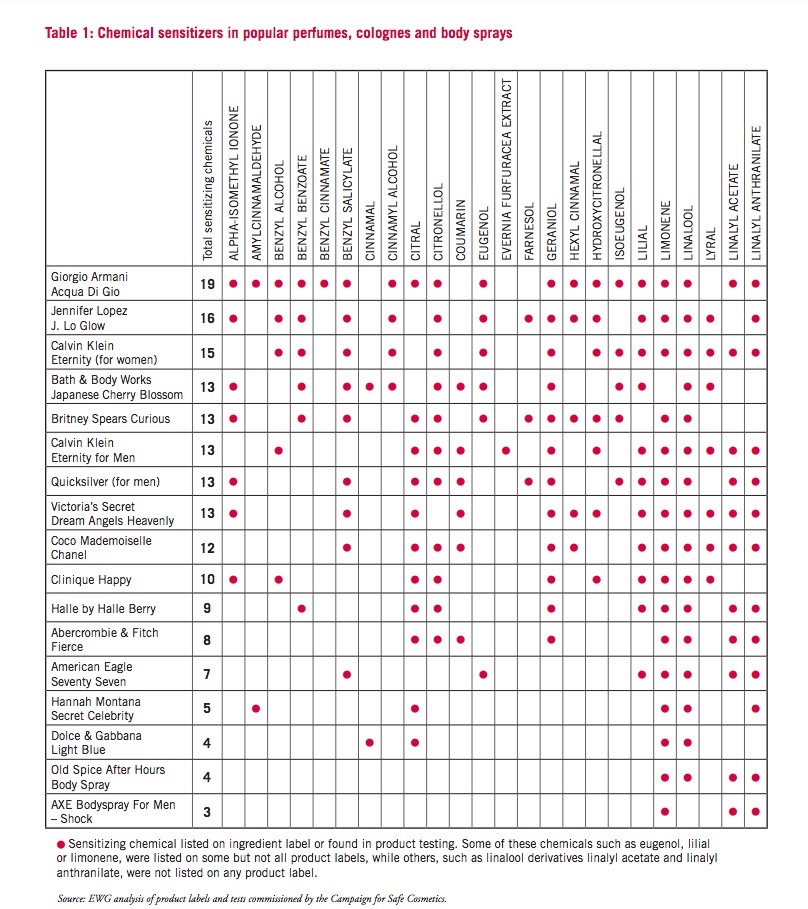
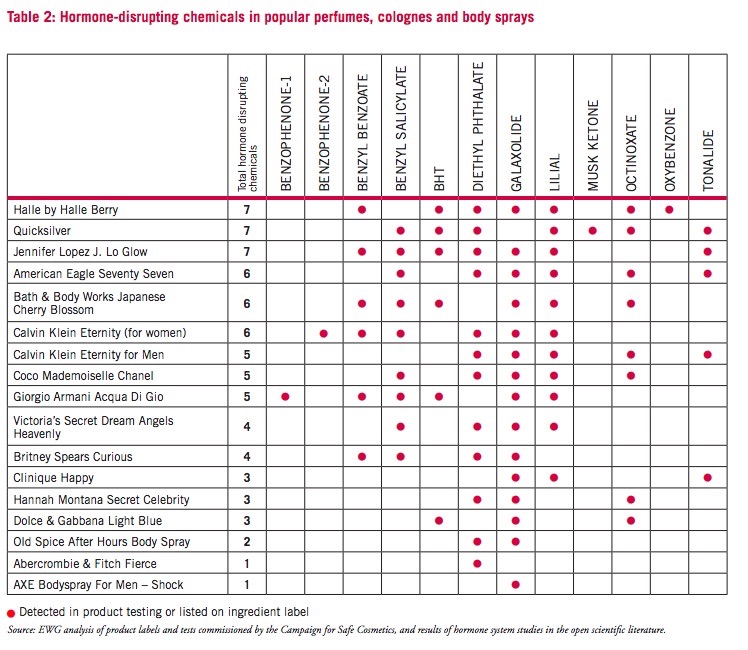
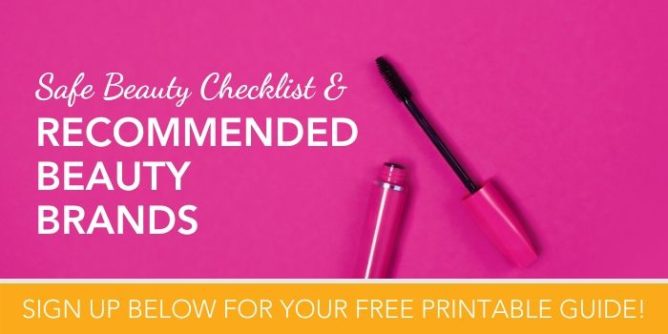

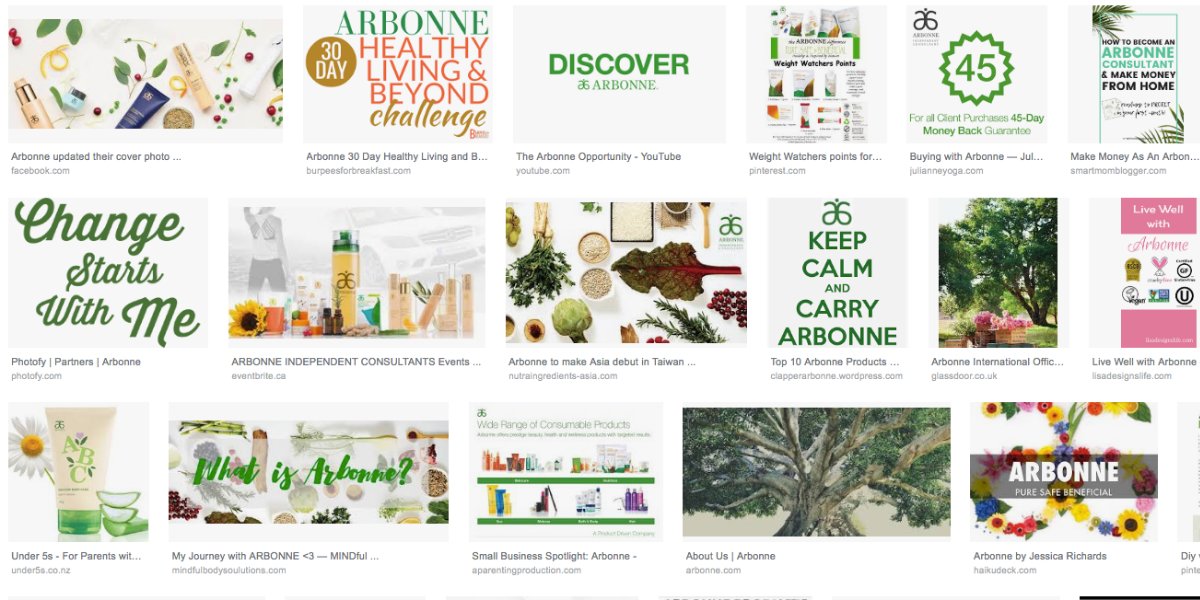



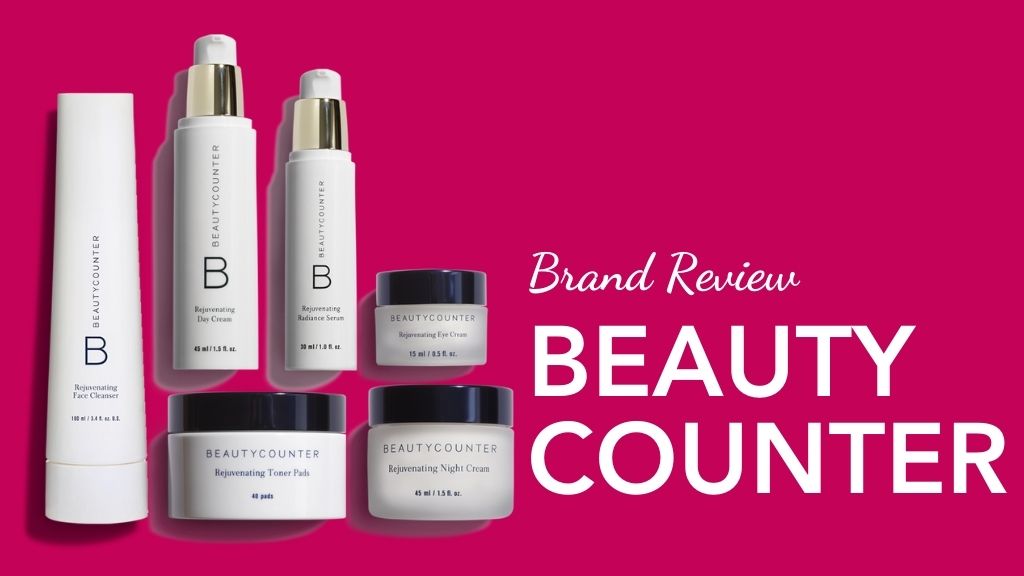



Great post, Meghan, thank you. Definitely grateful for truly organic perfumes made from essential oils – have loved and used them for a few years now. Can’t imagine ever going back to the toxic fake stuff now that I know what I know. Really appreciate your detailed presentation of the research and will be sharing your article for sure. I haven’t been able to keep up with my writing since welcoming babies #5 and 6 in 2013 and 2016, so I always appreciate finding well written articles I can share instead of having to write them myself. :)
Blessings,
Lacey :)
Meghan, I love you!! The first paragraph of this blog post had me fist bumping in agreement. Amen sista. And thank you so much for all of the incredible information and inspiration that you share with us. (I initially found you after I went to an Arbonne party and thought to do more research! Now I frequently cook from your Undiet cookbook and I am a big fan of what you offer in the world. So grateful.)
Thank you for putting this together. Some of these charts I’d like to copy and post around my town. The only thing is I find essential oils have toxicity too so I recommend usually hydrosols.
Even organic essential oils emit VOCs that can be hazardous, as well as form new pollutants and smog. Many EOs are serious allergens, and all have become accessibility barriers for the growing numbers of people who have MCAS/MCAD, asthma, migraines, chemical and environmental sensitivities.
To the people who use them medicinally, please don’t share your meds.
nice article. I guess. Ive been wearing fragrances and sell fragrances for 15 years. No issues over in my home or with my family.
Yes you must be respectful of others but you must also ne educated on applying and when and what to wear. I see your point but its a fruitless endeavor. The fragrance community is huge and growing every day
This sentiment is not much different from that of some smokers – “I’ve been smoking around my family, kids, others for years with no ill effects”. Bias. How do you know there are no ill effects, which can be subtle and, when accumulated over decades, hard to attribute to any particular source? How do we know that a decline in, say, school performance cannot be attributed to a reduced air quality? There have been numerous studies correlating air quality (including VOCs) to cognitive performance. Anything inhaled goes into our bloodstream. Almost everything. The alcohols in the aerosols, the chemical compounds constituting the fragrance. That means that a portion of these elements gets distributed around the body, reaching various organs, nerve cells, brain tissue (hence the intoxicating and neurodegenerative properties of inhalant abuse). One most obvious effect can be inflammatory damage to cells and interference with normal cell function through disruption/interference of regular chemical processes in those cells. Long-term regular exposure to volatile substances, such as solvents is known to damage the delicate brain structures, for instance. One form of such damage can be deterioration in myelin covering nerve fibers and leading to a reduction in cognitive abilities without necessarily directly damaging neurons. Unfortunately, the general public is mostly oblivious to this information, hence the lack of ability to objectively assess the health hazards of anything marketed to them.
As the author said – my baby is off-limits to anyone wearing too much perfume.
Thank you for writing this! I have mcs (multiple chemical sensitives). People can be so rude to us! I have been called a hypochondriac 3 times! By all man that knew me before I got worse (I’m in my 30s, so I’m not sure why I would suddenly become one). I have spent 13k so far in it! I have been treating it for a year and a half, so it’s not a quick fix. I get 0 acommodations at work. I think it affects my dating life (the guys say it doesn’t, but sometimes I don’t hear back from them). And that’s that I’m good looking.. it’s frustrating that people believe in food allergies but they can’t beliebe someone is sensitive to chemicals?! I think the word “sensitivity” in it downplays it. I don’t think people know much about it because some people are housebound from it. I feel like avoiding gluten, etc it’s easier (I’m gf right now) but like 90%+ of the population wears scented products. At least people can see bread, nuts, etc. no one can see smells, except for smoke
I also wish there were fragrance free hotel room options, rideshare, one bathroom in public places with no air refreshner, and one fragrance free soap dispenser, etc
It’s hard to state how alone people with fragrance sensitivity feel. Isolated, shunned, mocked and avoided, we are treated like we inconvenience everyone else. This is even when many of these people have constant runny noses, cough frequently, itch and have other medical conditions Doctors can’t diagnose.
I often leave a Doctor’s office sicker than when I went in due to cleaning chemicals, workers perfumed up or patients reeking of cologne. In hospitals I have asked for another nurse when the attending one has conflicting fragrances in every they wear and on their bodies. The Doctor’s pledge to ‘Do No Harm’ is just lip service to me.
During Covid I was desperate to find a hand sanitizer I could use. I finally found this one on Amazon, although all sanitizers have unwanted chemicals, at least this one didn’t smell. I hope this helps someone.
Babyganics Foaming Pump Hand Sanitizer, Alcohol Free, Fragrance Free, Kills 99.9% of Common Bacteria, Moisturizing, 8.45 Fl Oz (Pack of 3) https://a.co/d/2fZR0TL